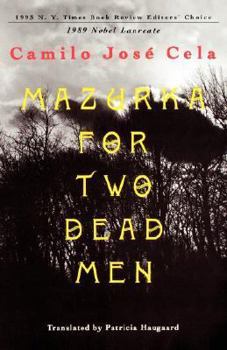Mazurka for Two Dead Men
Select Format
Select Condition 
Book Overview
Mazurka for Two Dead Men, the culmination of Camilo Jos? Cela's literary art, opens in 1936 at the beginning of the Spanish Civil War: Lionheart Gamuzo is savagely murdered. In 1939, as the war ends,... This description may be from another edition of this product.
Format:Paperback
Language:English
ISBN:0811212777
ISBN13:9780811212779
Release Date:September 1994
Publisher:New Directions Publishing Corporation
Length:320 Pages
Weight:0.80 lbs.
Dimensions:0.8" x 5.5" x 8.5"
Customer Reviews
4 ratings
Voices on the war
Published by Thriftbooks.com User , 23 years ago
Camilo Jose Cela is, to say the least, the greatest contemporary spanish language perfectionist to use the language at its worst and its best at the same time, even at the same paragraph (!). MAZURCA PARA DOS MUERTOS is a vivid example of that ilogic sentence, so you have to survive its 300,000 words of chaotic verbalia to proove it. Let's see. If you are a member of the Real Academia de la Lengua (that is the honorific comitee that stablished spanish-spoken rules and tools), Jose Cela, one of its most famous accolites, is a genious rebel whose capabilities are good enough to write a novel in a perfect-grammar but chooses to misspelled everything just for fun. Then, if you are a regular civil reader on a spanish spoken country (like me), he is the funniest Nobel Prize winner around. The novel goes around the Spanish Civil War on a fascinating but hard line that needs some big focusing effort on the first 50 pages. After the first blast goes by, those voices are here, inside, right into your head. And the bloody-thirsty war suddenly becomes speedy, catchy, even erotic. On a brilliant touch (one of the funniest in the novel, too), Cela recalls the "nine signs of the mother******". Two examples: the flute style voice and the shortness of extremities. Feel familiar? Well, to find out the other seven you have to check out the mirror this good lecture. Jose Cela is on a trail these days accused of rewriting someone's prior novel. After the Jurors deliberate they may want to sue him for MAZURCA PARA DOS MUERTOS, a sublime journey that rewrites Spain's violent and contradictory soul.
Cela's "Mazurka" is a tantalizing read!
Published by Thriftbooks.com User , 23 years ago
Camilo Jose Cela's works aren't generally for the masses--often Nobel Prize winners fall into this category!--but don't let his "literary success" frighten you. In "Mazurka for Two Dead Men," Cela's powerful style (read in translation, of course) is moving, argumentative, sophisticated, sometimes subtle--sometimes not: in short, an adventure in literary appreciation at the same time being worthy of one's time. Set in 1936 at the onset of the Spanish Civil War, "Lionheart" Gamuzo is abducted and killed, thus setting off (to borrow from the Greeks) a blood-will-have-blood revenge story. Tony, his brother, knows that revenge is his. Cela is high in symbolism as in these events the blind accordian player Gaudencio continually plays the same mazurka--the book echos just about every musical symbol possible, with its themes, moods, movements, rhythms, melodies, and so forth. Symbolism, too, is not lost on the Spanish society Cela captures and the political, social, and religious overtones are not easily missed. Still, "Mazurka" is a worthy continuation of Cela's writing abilities. Granted, this one's not his best, but still is in keeping with Cela's l989 Nobel Prize winning style. While, quite likely, "something may be lost in translation," still reading Cela, for me, is a pleasurable adventure. ([email protected])
This is a relatively newfound favorite of mine
Published by Thriftbooks.com User , 25 years ago
TRAGICOMEDY: it's all the rage. Or, at least in the establishment of "literary greats," this appears to be a trend. Camilo Jose Cela's book _Mazurka for Two Dead Men_ is no exception, and in this particular work, macabre humor is found on every page, interspliced with beautiful, confidingly poetic prose which Cela uses primarily to subtley change the moods of this book, which ends up playing out as something like an epic poem crossed with a drinking song with never-ending refrain. As a work of experimental fiction, this book is amazing. Cela's masterful control of his characters and dialogue is the token of his talent, which is showcased here in a manner which might seem cumbersome at first, but should be read in the manner in which a viewer attempts to see the image in the Magic Eye pictures at the mall- not by focusing directly on it in order to find it, but instead by shifting focus more to the periphery of the work. This book is hard to categorize and it's even harder to defend, since so few people I've recommended it to share my view that this is a masterpiece of rare achievement. (At least the Nobel Prize committee recognized his worth.) I still contend that they were reading it without realizing that Cela prefers to embed his story within the inobvious. This is how I ended up shucking the book off the three times before I ended up finally finishing it. It sure was worthwhile, though! I rushed out to get anything else he'd written. LITERARY SUPERSTAR
A lurid, comic tale of 1930's Spain.
Published by Thriftbooks.com User , 25 years ago
~It's probably not a classic for the ages, but I was still fairly entertained by this strange, rambling, wickedly funny revenge tale set during the Spanish Civil War. The simple, episodic plot (man kills his brother's murderer) is really just an excuse f~ in the grotesque. And it isn't as impressive as the other Cela novels I've read ("The Hive" & "The Family of Pascual Duarte"), but it's still a good opportunity for general readers to acquaint themselves with this delightfully eccentric--and st






